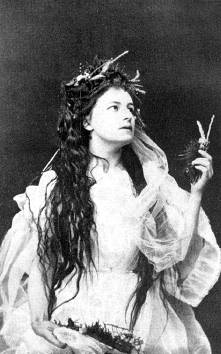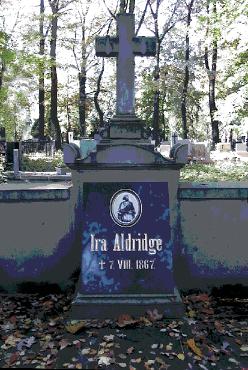Shakespeare in Poland: The Turn Of The Nineteenth Century
Shakespeare in Poland -- page 6
5. The turn of the nineteenth century: the star system in Polish Shakespearean theatre
The situation did not improve in the second half of the nineteenth century. When in 1873 the Warsaw Censorship Committee gave permission to stage Othello, the term "Governor" had to be replaced by the term "Lieutenant." The term "Governor" could, according to the authorities, be treated as an allusion to the Russian Governor, generally hated by Poles. A Midsummer Night's Dream was approved for production, but without Demetrius's statement that "walls have ears," while Antony and Cleopatra had to be trimmed in all the places that could be understood as the presentation of the supposedly lewd and immoral behaviour of the people in power (Secomska, 1971: 282, 302-303). [Note 21] Yet Shakespeare's plays were staged. In 1960 one of the theatre historians commented upon that period:
For Warsaw theatregoers, who in the nineteenth century could not even see Balladyna, the author of Hamlet and Macbeth was becoming a surprising defender of their rights, a valid "substitute" for Polish Romantic poets. In his works the audience found hidden allusions, understood only by them, to such burning issues as public morality, power, cruelty, justice, and attitudes to the government elected with the consent of the people and to a government self-imposed by the usurpers of power. (Csato, 1960: 3)
The very political situation and censorship of that time turned Shakespeare into a commentator on the current political and cultural events. It was indeed the beginning of the well-known "Shakespeare of allusions and metaphors," which dominated Polish theatrical life up to 1989. (For a fuller explanation of this term see the Section "World War II and The Communist Regime: Shakespeare in the Theatre of Political Allusions and Metaphors.")
At the time when the "wandering theatrical stars" were obtaining their greatest success in performing Shakespearean roles, such famous international performers as Adelaide Ristori (1822-1906), Ernesto Rossi, (1827-1896) and Tommaso Salvini (1829-1915) visited Poland. The first of them, Ristori, in 1856 performed in Warsaw, which was at the time under the Russian partition. She was so praised for her presentation of Lady Macbeth that she came back in 1858, 1865, and 1866. Encouraged by her achievements, Rossi came to Warsaw in 1877 and 1878. During his visits he presented, among others, Macbeth, Hamlet, Othello, Richard III, Coriolanus, Romeo and Juliet, and The Merchant of Venice. Rossi is an artist still known to every Polish high school student, since he became immortalised in Lalka (The Doll, 1890), one of the most important novels of nineteenth century Polish literature. Bolesław Prus (1847-1912), its author, attended his performances. He introduced Rossi as a character in his novel, which presents a panoramic view of life in Warsaw around the year 1880, with its main theme the energetic merchant Stanisław Wokulski's unfortunate, late love for Izabella Łęcka, a doll of the salon (Kujawińska Courtney, 2003: 101-104).
In 1882 Salvini and his troupe were invited to play in the Warsaw Grand Theatre on their way back from Moscow. The Warsaw Grand Theatre announced in the local paper (May 2) that "this great Italian artist would give three performances in May 16, 17 and 18 under the condition that all the tickets would have been sold before May 12." Assuming that Salvini's fame would attract the attention of the audience, the organisers did not, however, advertise his visit in any further way. Besides that, they did not even give the titles of the plays he was to present: Othello was to be the first. They lied to Salvini's agent that "all the tickets were almost purchased before the required date." When on his arrival Salvini learnt the truth, he refused to play. "My artistic stature," he explained in his open letter to the theatre director, "does not allow me to perform in front of an almost empty auditorium. Elsewhere people stand in lines to have the privilege of watching my acting" (Kurier Warszawski nr 109, 1882). The Meningen company, which came in 1885, staged Julius Caesar, The Winter's Tale, and Twelfth Night (Braumer 1937: 158-201). [Note 22]
The successes of the nineteenth-century internationally-acclaimed Shakespeare performers had a long-lasting effect on Polish culture. Ira Aldridge (1807-1867) is of special importance, since his eight visits over the 1853-1867 period inspired Polish translations of Shakespeare's plays and influenced the artistic style of many Polish players for years to come (Kujawińska Courtney, 2003: 117-138). His first performances of Othello with German companies motivated Jozef Paszkowski (1817-1861) to prepare a Polish translation of the original, which was used for the first time by a Warsaw troupe during Aldridge's visit in 1863. Polish reviews of his performances praised the realistic renditions of his roles. More recent comment has suggested that Aldridge was a harbinger of Realism in the theatre (Udalska, 1993: 215).
There were also at that time many other outstanding Polish stars who performed in Shakespeare plays. Józef Rychter (1820-1885) and Wincenty Rapacki (1840-1924) were especially praised for their presentations of Shylock. Though initially Rychter presented his Shylock as a comic figure, the actor gave him a tragic dimension in the trial scene. It was possible, as Jerzy Got maintains, to detect that "the verdict of the court had killed him [Shylock], and that he would be going home to die."
Rapacki, whose fame resulted mainly from his "faithful, photographic representation of reality upon the stage," interpreted Shylock as
a Jew--a usurer endowed with an immensely rich internal and external character, a cruel man deprived of all the tender feelings, even in his relations with his daughter. (Gott, 1965: 79-80)
Later in his career Rapacki was also greatly valued for his rendition of Hamlet as a dreamer and poet, who suffers from a psychological breakdown. Bolesław Ladnowski built his fame in the roles of Othello, King Lear, and Hamlet.
|
Helena Modrzejewska (1840-1909), internationally known as Modjewska, was the female partner of Jan Królikowski (1820-1886), Ladnowski, and Boleslaw Leszczyński. [Note 23] The critics usually classify her artistic style as a highly developed version of Romantic Realism flavoured with a classic sense of beauty and harmony (Żurowski, 2001: 132-140). |
 Helena Modrzejewska as Ophelia, Cracow 1867. Click on the image to see a larger version. |
In the context of Polish nineteenth century theatre appropriation of Shakespeare, a special place is occupied by Stanislaw Koźmian (1836-1922), who in 1866-1868 and in 1871-1985 acted as a manager/director of the Cracow Theatre. Because of his efforts, about twenty new translations of Shakespeare's plays were staged, among them Twelfth Night, A Midsummer Night's Dream, and As You Like It. Some of these new renditions in Polish were written by Stanislaw Egbert Koźmian (1811-1885), his grandfather's nephew. As an advocate of realism, Stanislaw Koźmian initiated a new way of staging Shakespeare, and his realistic style was later followed many other Polish directors. He was also responsible for a general reform of theatre life, since he abolished the emploi and star-system. [Note 24]
At the beginning of the twentieth century Shakespeare was seen as an inseparable part of Polish culture. His plays constituted a substantial part of the theatre repertory. All his works were translated into Polish and first attempts of critical evaluation were published. The work by Stanislaw Wyspiański (1869-1907), an eminent Polish painter, poet, dramatist, and literature and theatre critic of the Neo-Romantic period, is usually regarded as the culmination of the Polish appropriation of Shakespeare at that time. His Studium o "Hamlecie" (Study in "Hamlet," 1905) not only interprets the text of the play, but also directs its imaginary performance, gives fragments of its translation, supplies illustrations of its characters, and locates Hamlet in the Polish political, social, and cultural contexts. After Wyspianski's interpretation of the play, Hamlet has indeed become "the Polish Prince." And the dramatist's famous saying "In Poland the puzzle of Hamlet means: everything that is in Poland to think about," succinctly conveys the gist of Polish appropriation of this Shakespeare play. Though Wyspianski found his artistic inspiration in some other Shakespeare works (Macbeth, Richard III, and The Tempest), it was his interpretation of Hamlet that laid foundation to Polish interpretations of the play for decades (Miodońska-Brookes, 1997).
Notes
[21] Georges Brandes, who travelled in Poland many times in the nineteenth century, remarked:
Even the cookery books are subjected to the censorship, and are corrected with such puerility that lately in the phrase "to be boiled over a free fire," "fire" was erased because the word "free" was used (1903: 86). [Back]
[22] There was also the visit of Sarah Bernhardt, who played in Warsaw in 1882, but she did not present any of Shakespeare's plays. [Back]
[23] Modrzejewska emigrated to the USA where she gained a worldwide recognition for her Shakespearean roles. America became her second motherland, and her name is often listed among the most outstanding Polish Americans: Tadeusz Kościuszko (1746-1817), Kazimierz Pułaski (1747-1779), and Ignacy Paderewski (1860-1941). [Back]
[24] Stanislaw Koźmian was also actively engaged in Polish political and social life. He regularly wrote theatrical reviews and worked as the editor-in-chief of Czas, one of the most significant periodicals, which though published in Cracow had a wide readership across Poland. [Back]

